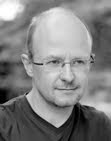Kingsley
 At a Brussels event earlier this week (not particularly related to photography) I was lucky to meet Olivier Jobard, a young French photo journalist, working for the SIPA press agency. By all means have a look at his impressive portfolio at www.sipa.com. This is Olivier's short resumé on the SIPA website:
At a Brussels event earlier this week (not particularly related to photography) I was lucky to meet Olivier Jobard, a young French photo journalist, working for the SIPA press agency. By all means have a look at his impressive portfolio at www.sipa.com. This is Olivier's short resumé on the SIPA website: "Born in 1970, Olivier Jobard graduated from the Ecole Nationale Superieur Louis Lumière photo school in 1991. In 2004, he was the first photographer to cover the Darfur conflict and was the only Western journalist to enter Fallujah. A veteran of international and civil conflict, Olivier Jobard has documented the human consequences of war across the globe: Sudan, Iraq, Afghanistan, Sierra Leone, Liberia, Ivory Coast, Chechnya and the disintegration of the former Yugoslavia. In his 14 years with Sipa Press, he has earned numerous grants and awards: including the Scoop d' Angers (1996 and 1997), the Fuji Professional award (1996 and 1998) and the Picture of the Year award (2000). In 2004, he was honored with the Visa d'Or at Visa pour l'Image in Perpignan, for his humanitarian reportage on the Darfur conflict. That same year he also received the Grand Prix Paris-Match for his photographs of illegal African immigrants fleeing their continent for Europe."
One of Olivier’s key interest is worldwide migration from low opportunity areas on our globe to the rich industrialised world. Every year, more then 500.000 people flee the poverty of their home country in a desparate attempt to secure some sort of future. Success is not at all guaranteed and the journey is full of risks. Some of them perish on the way. Others, mobbed by gangs or unable to cope with the hardships on the way, get stuck. They are lucky if they get back to their point of departure. Those who eventually get to the shores of the promised land risk being sent back to their home country. Those who are allowed to stay on have to start building up a new life from scratch.
In Brussels he presented a personal project – “The hard way, the only way”, completed over a 6 month period in 2005 - whereby he followed the tracks of a 22-year old Cameroonian, Kingsley, in his attempt to immigrate illegally to France. The journey started in West-Africa and went through Nigeria, Niger, Algeria and Morocco to the Canary Island and so onward to Spain and France. Marval recently published this work in a sober volume: "Kingsley". The colour pictures (Leica work) are woven around the story of Kingsley's journey as told from a first person point of view. I'm not trying to be politically correct by saying it is a gripping story. It simply is: "La route abîme les hommes". The images complement the words very well: they are penetrating and unassuming at the same time.


0 Comments:
Post a Comment
<< Home